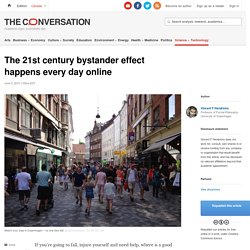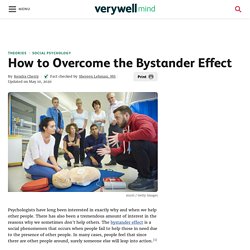

Bystander Effect Definition. Bystander Effect. Bystander effect, the inhibiting influence of the presence of others on a person’s willingness to help someone in need.

Research has shown that, even in an emergency, a bystander is less likely to extend help when he or she is in the real or imagined presence of others than when he or she is alone. Moreover, the number of others is important, such that more bystanders leads to less assistance, although the impact of each additional bystander has a diminishing impact on helping. Investigations of the bystander effect in the 1960s and ’70s sparked a wealth of research on helping behaviour, which has expanded beyond emergency situations to include everyday forms of helping. By illuminating the power of situations to affect individuals’ perceptions, decisions, and behaviour, study of the bystander effect continues to influence the course of social psychological theory and research. Bystander intervention Get exclusive access to content from our 1768 First Edition with your subscription. Bystander Effect. A Summary of the Bystander Effect: Historical Development and Relevance in the Digital Age.
Story of Kitty Genovese. The Kitty Genovese murder in Queens, New York, in 1964 is one of the most famous murder cases to come out of New York City and into the national spotlight.

What propelled it wasn’t the crime or the investigation, but the press coverage that alleged the murder had many witnesses who refused to come to the Kitty Genovese’s defense. This has been disproved over time, but not before it became part of the accepted lore of the crime. Kitty Genovese was returning from work home at around 2:30 a.m. on March 13, 1964, when she was approached by a man with a knife. Genovese ran toward her apartment building front door, and the man grabbed her and stabbed her while she screamed.
The Kitty Genovese Murder and the Social Psychology of Helping. The 21st century bystander effect happens every day online. If you’re going to fall, injure yourself and need help, where is a good place to do it?

Should you choose a busy thoroughfare or a deserted backstreet? Statistics and experiments in social psychology will tell you that if you need help, you should avoid dropping in a busy street, even if hundreds of people are passing through. This is because of a phenomenon known as the bystander effect. The more individuals gathered in one place, the less chance there is of one of them coming to the aid of a person in need. When an emergency situation occurs, it’s more likely that someone will come to the rescue if there are fewer or almost no witnesses. And in the 21st century, when our thoroughfares are online and on social networks, millions of people are effectively passing each other by every minute. The presence of other people has long been shown to give rise to confusion about responsibility. Examples of the Bystander Effect - Owlcation - Education.
Just Admit It, You've Done It Have you ever driven by a car accident?

Factors causing Bystander Effect. Causes of Bystander Effect. Bystander Effect Factors. Example scenario of Bystander Effect. Fear of Negative Evaluation Affects helping Behavior The Bystander Effect Revisited. Ethics Defined: Diffusion of Responsibility. Bystander effect - Diffusion of responsibility. Bystander Intervention in Emergencies: Diffusion of Responsibility. Ambiguity. Research on Ambiguous Situation Reactions. Bystander effect: Famous psychology result could be completely wrong. By Grace Browne SolStock/Getty If you were being attacked, would anyone stop to help you?

A famous result in psychology known as the bystander effect says probably not, but now a review of real-life violent situations says this commonly held view may be wrong. Kitty Genovese Case: What History Got Wrong. How to Overcome the Bystander Effect. Psychologists have long been interested in exactly why and when we help other people.

There has also been a tremendous amount of interest in the reasons why we sometimes don't help others. The bystander effect is a social phenomenon that occurs when people fail to help those in need due to the presence of other people. In many cases, people feel that since there are other people around, surely someone else will leap into action.1 While the bystander effect can have a negative impact on prosocial behavior, altruism and heroism, researchers have identified a number of different factors that can help people overcome this tendency and increase the likelihood that they will engage in helping behaviors.2 Some of these include: Witnessing Helping Behavior Sometimes just seeing other people doing something kind or helpful makes us more willing to help others.
Imagine that you are walking into a large department store. Being Observant Being Skilled and Knowledgeable Guilt Feeling Good. Stages of bystander intervention Source Adapted from Latane and Darley as cited in. Bystander Effect: If You Need Help, You'd Better Ask For It. Picture this.

You’re out hiking in the wilderness—all alone and miles from civilization. You turn a corner on the trail and come upon a young man in torn clothes, looking disheveled and a little incoherent. You’re on your way to your campsite, but he clearly needs help. As you approach, he explains he broke his leg, he’s been in the woods for days, and that he’d appreciate it if you could carry him, even just a few meters, to help him get back to the trailhead. What do you do? If you’re a half-decent person, I can guess you chose the first option: to stop and help. So, not only do you help, you probably cancel your plans and help carry the guy all the way back. Now, picture this. You’re dressed up and walking downtown to your first day at a new job. Halfway there, you see a homeless man holding a sign: “Down on my luck.